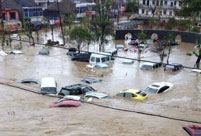WASHINGTON, Oct. 14-- Nobel laureate Robert Shiller said on Monday that he didn't expect the United States would default on its debt.
"I'm thinking probably nothing big is going to happen. It should be OK," Shiller said at a livestreamed press conference in New Haven, Connecticut, on being awarded the Nobel prize for economics together with two other American scientists Monday.
The Yale University economist said it's his sense that "we still have in this country a sense of cooperation that will emerge and prevent default."
"We have been through this before, notably in 2011," said Shiller. He recalled the fiscal fight in August 2011 which pushed the United States to the brink of a default but was resolved on the eve of the deadline. The subsequent downgrading of the country 's triple-A credit rating, however, rattled the market and shook investors' confidence.
"I'm thinking this crisis will likely be resolved. We won't see a default. Even if we do, it will be for one day or something like that, and even if it's longer, its not the end of the world," he said. "I don't know the future, I would be wrong."
Shiller, the sterling professor of economics at Yale University, on Monday was awarded the 2103 economics Nobel Prize together with Eugene Fama and Lars Peter Hansen, both of whom are professors of the University of Chicago. The three were bestowed with the Nobel prize for their "empirical analysis of asset prices," according to the Royal Swedish Academy of Sciences.
Shiller said he was getting out of the shower and was not properly dressed when the news came by telephone. "It was quite a surprise when it happened. I certainly didn't expect it."
At the event, Shiller also listed out 22 co-authors around the world who contributed to his work, while congratulating the two other co-winners.
He said finance is often misunderstood as a field about how to make money, or get rich. But in his mind, it is a study of human activity at large, and about making the resources available, incentivizing people and spreading the risks.
He believed rising inequality is the most important problem for now. "We should be thinking about this now, not wait until after it happens," he said, calling for a contingency plan to raise taxes on the rich.
Asked whether he had any recommendations for Janet Yellen, Obama's pick for the next chair of the Federal Reserve, Shiller said he is very impressed by Yellen's good sense, but he would not presume to tell her what to do.
"I think she has a lot of expertise," he said, adding that someone in Yellen's position has to look at "the welfare of everyone."
 2013 Colour Me Rad 5K run held in Canada
2013 Colour Me Rad 5K run held in Canada China's destroyer Qingdao sails out of Sydney Harbor
China's destroyer Qingdao sails out of Sydney Harbor Chinese tycoon aims to restore London's Crystal Palace
Chinese tycoon aims to restore London's Crystal Palace Worst flooding hits Yuyao, 70% of downtown area underwater
Worst flooding hits Yuyao, 70% of downtown area underwater Game for the brave: 'Spiders' in Yandang Mountains
Game for the brave: 'Spiders' in Yandang Mountains Hungarian wingsuit flyer confirmed dead in Zhangjiajie
Hungarian wingsuit flyer confirmed dead in Zhangjiajie New couples take wedding photos during holiday
New couples take wedding photos during holiday Serena Williams stumbles through to quarterfinals
Serena Williams stumbles through to quarterfinals Thailand Mobile Expo 2013 kicks off
Thailand Mobile Expo 2013 kicks off Photo collection of Chinese Navy
Photo collection of Chinese Navy Photo story: Young tenants in Beijing
Photo story: Young tenants in Beijing Twins Culture Festival kicks off in Beijing
Twins Culture Festival kicks off in Beijing UNESCO world heritage site: Montale Tower
UNESCO world heritage site: Montale Tower Israeli drone crashes into Mediterranean, fragments recovered
Israeli drone crashes into Mediterranean, fragments recovered Serena Williams wins second China Open title
Serena Williams wins second China Open titleDay|Week|Month